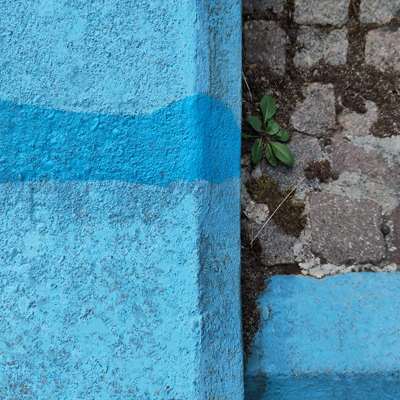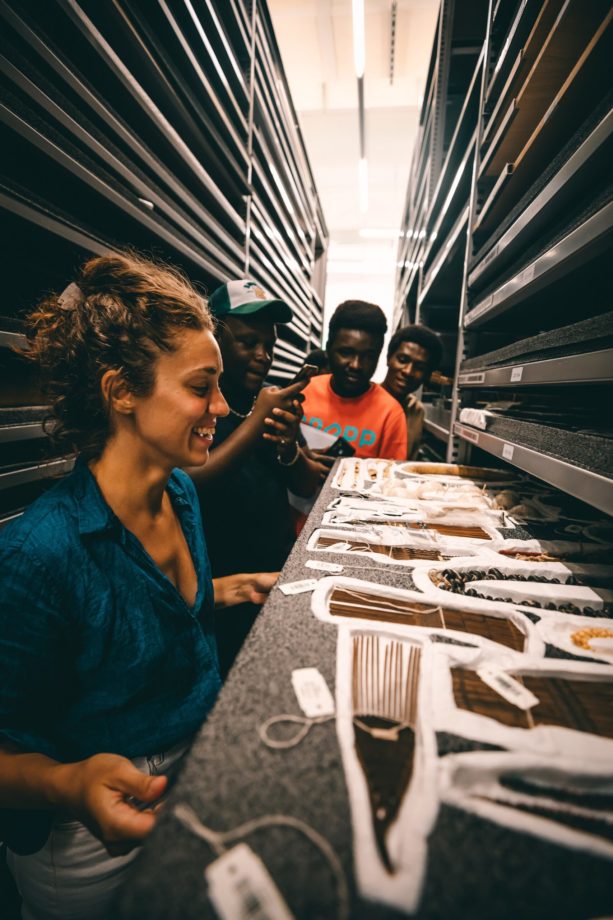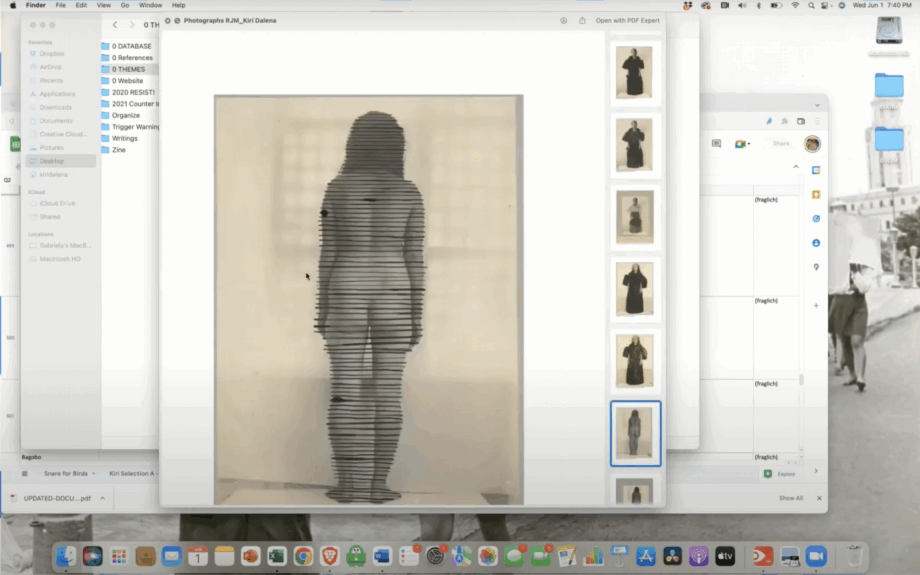Reimagining Colonial Archives: The LEAKY ARCHIVE Project at Cologne’s Rautenstrauch-Joest-Museum

Image: Kathleen Heft, image editing: Lea Farah Heiser, CC BY-SA 4.0.
In an era where museums worldwide are grappling with their colonial legacies, Germany’s Rautenstrauch-Joest-Museum (RJM) in Cologne embarked in 2022-2023 on a digital initiative that challenged traditional approaches to archival preservation and access. The LEAKY ARCHIVE project, a collaboration with the Academy of Media Arts Cologne (KHM), represents an experiment in decolonizing museum collections through collaborative, digital methodologies that prioritize transparency, accessibility, and multiple perspectives.
What was Leaky Archive?
LEAKY ARCHIVE was a project that aimed to work collaboratively in digital and analog spaces on the museum’s collections, making content and structures more open and polyvocal. During two years, the project focused on new perspectives of hybrid collaboration through decentralized infrastructures, explicitly emphasizing contradictory forms of knowledge and insight generation rather than insisting on consensus.
The name itself is provocative and intentional. Rather than viewing leaks as security breaches to be prevented, the project embraces the concept of “leakiness” as a positive force, allowing information, perspectives, and voices to flow freely beyond traditional institutional boundaries and channels.

Image: © Salman Abdo & Fadi Elias. Guided tour of the depot as part of the Breath! project.
The Challenge: More Than 165,000 Stories Waiting to be Told
The RJM’s collection database contains around 165,000 entries, most of which at the time contained minimal information. The project started as a way to make this vast repository more transparent and accessible. The collections encompass approximately 70,000 everyday and ritual belongings and around 100,000 historical photographs from Oceania, Asia, Africa, and the Americas, accumulated since the museum’s founding in 1901 in Cologne. These massive collections represent centuries of cultural heritage, much of it acquired during Germany’s colonial period when European museums systematically collected objects from their colonies and territories of influence.
Traditional cataloging methods often reduce complex cultural objects to basic descriptive data, stripping away context, meaning, and the voices of the communities from which these items originated. Objects that once held ceremonial significance, everyday utility, or artistic expression were transformed into museum specimens, their original purposes and cultural meanings often lost or misinterpreted through European classificatory systems. The digital databases, while making information theoretically more accessible, often perpetuate these reductive approaches by reproducing colonial-era descriptions without acknowledging their limitations or biases.
Institutional Context: Two Unlikely Partners
The collaboration between the RJM, led by Agustina Andreoletti, and the KHM, led by artist Sam Hopkins, brought together two institutions with very different histories and approaches to cultural work. While the RJM has a history of traditional ethnological collecting practices that were deeply embedded in colonial knowledge systems, the KHM, established in 1989, represents a much younger institution focused on contemporary digital and media arts. This institutional difference proved crucial to LEAKY ARCHIVE’s innovative approach, combining the museum’s vast historical collections with the art school’s experimental digital methodologies and critical contemporary perspectives. This collaboration impulsed new possibilities for how established cultural institutions might engage with more experimental approaches to their holdings and public engagement.
A New Approach to Knowledge Creation
The project’s embrace of “leakiness” runs counter to institutional instincts toward control and preservation. Traditional archives prioritize containment, protecting objects from damage, maintaining stable environmental conditions, controlling access to prevent theft or mishandling, and preserving certain authority over interpretation and presentation. However, LEAKY ARCHIVE’s concept suggests that some degree of institutional “leakage” – allowing information, interpretations, and even institutional control to flow beyond traditional boundaries – might be necessary for meaningful decolonization.
This philosophical shift reflects broader changes in information culture brought about by digital technologies. In an era when knowledge increasingly flows through networked, collaborative platforms rather than hierarchical institutional channels, museums face pressure to adapt their practices or risk becoming irrelevant to contemporary cultural conversations. In this way, the project positioned itself at the intersection of these technological and decolonial pressures, using digital tools not merely to digitize existing practices but to fundamentally reimagine how cultural institutions might operate.
The project’s methodology deliberately moved away from traditional museum practices in several key ways. Rather than seeking a single, authoritative narrative about items in the collections, LEAKY ARCHIVE welcomed multiple, even conflicting interpretations. This approach acknowledged that cultural objects can hold different meanings for different communities and that these varied perspectives are valuable rather than problematic. This polyvocal approach was also technically worked through: utilizing decentralized digital infrastructures, the project moved away from top-down, institutional control of information. This allowed for more democratic participation in knowledge creation and sharing, breaking down hierarchies and preserving authorship.
Program Components and Innovative Formats
LEAKY ARCHIVE encompassed a rich variety of formats designed to engage different communities and perspectives to knowledge production and mediation. The project included digital fellowships, public lectures and performances, collaborative work sessions, workshops for young people, two seminars (at the KHM and at the University of Fine Arts Münster (Class Mariana Castillo Deball), an exhibition, a festival (in cooperation with MedienwerkNRW), and depot tours that opened typically restricted museum spaces to broader participation.
Digital Fellowships
The two rounds of digital fellowships were specifically directed at artists, activists, makers, academics and cultural workers from the Global South, living in the Global South. These fellowships provided a platform for contemporary voices to engage with the historical collections allocated in the museum, offering interpretations and contexts that may have been overlooked or suppressed in RJM’s traditional museum narratives and are relevant and urgent in the communities where the belongings stemmed.
Each fellowship round offered three-month residencies. Fellows like Anahí Rayen Mariluán, Adaptive Radiations Working Group (Mica Cabildo & Curtis Cresswell), Awuor Onyango, Bea Mariano, Donja Nasseri, Emdadul Hoque Topu, Gatari Surya Kusuma, Ifunanya Madufor, Isabella Celis Campos, Juan Cortés, and Miriam Hillawi Abraham explored individual research ideas through digital public platforms, concluding their residencies with lectures, publications and workshops that shared insights from their investigations.
Edit-a-thons
These intensive collaborative sessions brought participants together to collectively work on the museum’s digital database. One particularly significant edit-a-thon, led by artist, writer, and researcher Fatima Khan, focused specifically on the museum’s photographic collections dating from the early days of photography through the 1970s. Khan selected images taken in Bangladesh to work with during the session, creating a space where participants could engage directly with colonial photography while questioning the embedded perspectives and power dynamics within historical documentation.

Image: © Kiri Dalena. Screenshot of Kiri Dalena’s presentation of her edited version of the RJM photographic database, contextualized within the Philippines.
The participants working with Fatima Khan on historical photographs from Bangladesh found themselves confronting not just technical questions about metadata and description, but fundamental epistemological challenges about knowledge, representation, and cultural translation. The experience of scrolling through digitized colonial-era photographs highlighted how digital accessibility can paradoxically reproduce colonial violence if not accompanied by critical framework and community input. Khan’s preliminary work on Bangladesh’s colonial history provided essential context, but also demonstrated how much specialized knowledge is required to approach colonial materials responsibly.
The workshop participants’ ultimate reluctance[i] to change existing descriptions reflected both appropriate caution and a recognition that meaningful decolonization requires more than individual good intentions or workshop-level interventions. This hesitation also revealed the psychological and emotional labor involved in decolonization work. Participants reported feeling overwhelmed by the complexity of seeing and organizing, questioning not just what they were viewing but why they were seeing what they saw. This phenomenological dimension of archive work suggests that technical solutions alone cannot address the deeper epistemological challenges of colonial collections.
Youth Programming: Next Generation Perspectives
The Leaky Archive project placed particular emphasis on engaging young people through innovative formats that provided access to museum spaces and collections through distinct levels, designed to create different forms of encounter between young participants, the collections and a broader community.
The most intensive format involved a weeklong camp for teenagers who were invited to sleep in the museum and received access to depot areas. The participants were encouraged to engage with items in the collections first through aesthetic exploration, then through research, ultimately developing responses through photography, graffiti, and peer-to-peer guided tours. The immersive approach created opportunities for young people to develop intimate relationships with museum spaces and practices outside of conventional visitor frameworks, recognizing them not just as recipients of museum education but as cultural interpreters in their own right.
A second format emerged through collaboration with the Breath! project, bringing together young adults from the Afropean (Belgium) and Integrationshaus e.V. (Germany) to work with collections connected to their personal and family biographies. This intergenerational approach encouraged participants to trace connections between historical colonial collections and their own lived experiences through video works. The collaboration highlighted how colonial collections continue to shape contemporary experiences for communities with connections to formerly colonized regions.
Depot Tours and Behind-the-Scenes Access
The project opened typically restricted museum spaces through guided tours of the collection storage areas. These regular tours brought between ten and twenty participants at a time into the basement storage facilities, accessed through massive elevators that emphasized both the exclusivity and institutional power of traditional archival access. The tours revealed the practical challenges of object preservation, provenance research, and restitution processes while making visible the sheer scale of the collections, with thousands of objects stored in organized but overwhelming arrangements.
The physical experience of entering the depot spaces proved as significant as the intellectual content of the tours. Seeing rooms full of objects from across Africa, Oceania, Asia, and the Americas concentrated in a German basement highlighted the scope of historical displacement and raised immediate questions about how restitution might practically proceed given such vast holdings. The discussions helped participants understand why decolonization work proceeds slowly and unevenly, mostly not due to lack of institutional commitment but because of the complex legal, ethical, and practical challenges involved in unwinding centuries of colonial collecting practices.
Challenges and Considerations
While innovative, the project also faced significant challenges. Questions arise about how to balance scholarly rigor with community input, how to verify information contributed by diverse sources, and how to navigate potentially sensitive cultural and political issues surrounding colonial collections.
- Accessibility and Participation
One of the most significant challenges LEAKY ARCHIVE addressed was ensuring meaningful participation across global digital divides. While the project aimed to support voices from the Global South, it had to navigate varying levels of internet access and technological infrastructure across different regions.
The project’s decentralized approach required careful consideration of how to make participation truly accessible rather than merely theoretically open. This included developing user interfaces that could function on lower-bandwidth connections, providing multiple language options, and creating offline components that could later be integrated into the digital archive.
Looking Back: Project Legacy and Lessons Learned
The LEAKY ARCHIVE project, which concluded in November 2023, explored how colonial archives and collections could be critically developed and reflected upon with the help of digitality, positioning itself at the forefront of international discussions about decolonizing museums. During its active period, the project successfully demonstrated how digital technologies could facilitate more inclusive, collaborative approaches to cultural heritage. Its emphasis on multiple perspectives, community engagement, and transparent access provided valuable insights for other institutions seeking to address their colonial legacies.
However, the conclusion of the LEAKY ARCHIVE highlights a persistent challenge facing innovative cultural initiatives: the sustainability crisis inherent in third-party funded projects. Like many groundbreaking museum and digital humanities endeavors, LEAKY ARCHIVE operated within the constraints of finite grant funding (in this case by Kulturstiftung des Bundes and MedienwerkNRW), raising crucial questions about the long-term viability of institutional transformation efforts.
Conclusion
LEAKY ARCHIVE contributed to a paradigm shift in how museums can engage with their collections and communities in the digital age. By embracing “leakiness” rather than institutional control, prioritizing multiple voices over singular narratives, and using technology to facilitate rather than restrict access, the Rautenstrauch-Joest-Museum charted a path toward more equitable and responsive cultural institutions.
The project served as both an inspiration and a practical model for museums worldwide seeking to transform their colonial archives into tools for understanding, reconciliation, and collaborative knowledge creation. In doing so, it demonstrated that the future of cultural preservation lies not in protecting artifacts from the world, but in opening them up to it.
This text is licensed under a Creative Commons Attribution 4.0 International License (CC BY 4.0). This license allows reusers to distribute, remix, adapt, and build upon the material in any medium or format, so long as attribution is given to the creator. The license allows for commercial use. https://creativecommons.org/licenses/by/4.0/
All images are licensed separately. The copyright holder and any license information is indicated separately below each image.
Agustina Andreoletti is an art historian and cultural worker from Argentina. Her projects address concepts of techno-colonialism, collaboration, power infrastructures, and distributed agency. 2020-2023, she worked at the Rautenstrauch-Joest-Museum, where she was in charge of the public program and led the project LEAKY ARCHIVE. In 2024, she served as an Assistant Professor for Networks at the Academy of Media Arts Cologne. She is currently a doctoral candidate in the Departments of Art Theory and Social and Cultural Anthropology at the University of Cologne, where she is completing her dissertation on the digitization of colonial heritage collections and transcontinental partnerships. Agustina is based in Berlin and works as a consultant in the field of digital cultural heritage.
[i] De Muirier, Julienne (2024): Erfahrungsbericht PEER TO PEER-Archive. In: Peer to Peer – Monat der Medienkunst NRW, p. 24-33. https://www.medienwerk.nrw/wp-content/uploads/2024/05/Magazin-Peer-to-Peer.pdf (last checked: 04-09-2025).

































